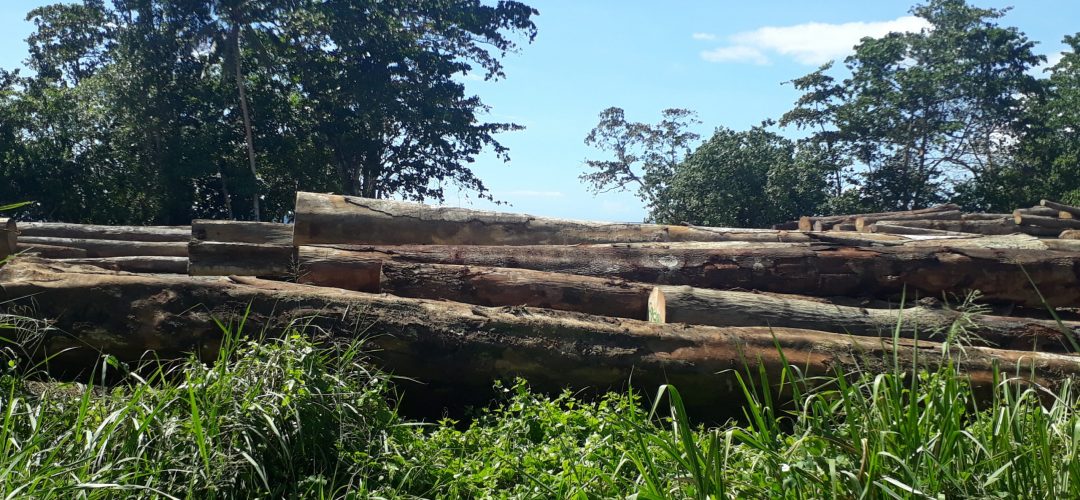USP Journalism alumni receive grant for environmental reporting

Piles of logs in the Solomon Islands. Six journalists from the South Pacific have been awarded story grants by Internews’ Earth Journalism Network to cover environmental reporting in Fiji, Solomon Islands and Papua New Guinea. Picture: File
By WANSOLWARA STAFF/EJN
Two USP Journalism alumni are among six recipients of a prestigious regional environmental reporting fellowship.
Experienced journalists Stanley Simpson and Sheldon Chanel were awarded story grants from the Internews’ Earth Journalism Network (EJN) to conduct investigative environmental reporting in the country.
Chanel, who is also a consulting editor for Wansolwara, The University of the South Pacific’s independent journalism student newspaper and online publication, said his focus was investigating the impact of overfishing and unregulated exploitation of undersized species in coastal areas in Fiji.


“I am passionate about conservation and this grant is an opportunity to explore an issue that impacts a number of communities in the country,” he said.
“I appreciate the opportunity to work with EJN, which is a renowned media development organisation in the world. I am fortunate to have access to the expertise available within EJN in the field of environmental journalism.”
USP Journalism co-ordinator Dr Shailendra Singh said the awards would allow regional journalists to focus on the environment, which does not get as much coverage as warranted.
“It is pleasing to see two distinguished USP journalism colleagues among the recipients. This is part of USP Journalism’s growing ties with EJN,” he said.
USP Journalism had also secured a $20,000 from EJN last year to boost environmental reporting in the region.
The EJN/USP Journalism project titled, ‘Adapting to and mitigating effects of climate change and island sea level rise’, involved journalism students conducting climate change reporting in the Cook Islands and the Solomon Islands.
The journalism programme has won a number of national and regional awards for environmental reporting, including the 2010 Vision Pasifika Climate Change Media Awards by the Secretariat of the Pacific Regional Environment Programme (SPREP).
Other recipients of the EJN grant for the South Pacific include Fiji journalist Luke Rawalai, Benjamin Kedoga from PNG, and Alfred Evapitu and Charles Piringi from the Solomon Islands.
The journalists would focus their coverage on the importance of mangrove ecosystems for bay conservation, impacts of logging on biodiversity and problems with capturing undersized fish.
According to the EJN, coverage was also extended to issues such as the displacement of marine life due to sea level rise, challenges faced by climate migrants as well as the illegal export of endangered and protected tree species.
“EJN provided funding in March this year specifically for coverage by South Pacfic journalists as part of our efforts to deepen support for environmental reporting in the vast region,” EJN said in a statement.
Following a competitive call for story proposals, EJN also recently selected six journalists to receive story grants for investigative environmental reporting. The grants are part of EJN’s Asia-Pacific project and would cover reporting projects in Bhutan, China, Indonesia, India and Vietnam.
Their investigations are wide-ranging, seeking to expose issues such as the environmental impacts of mega hydropower projects, the pollution and resultant health risks posed by reckless disposal of hazardous industrial waste, and how a lack of regulation and transparency combined with geopolitics are undermining efforts to tackle air pollution and its health consequences.
This is EJN Asia-Pacific’s second batch of investigative story grantees in 2020, and follows a round of grants awarded to another five journalists from India, Indonesia, Vietnam and the Cook Islands.
“Those grants were awarded at the beginning of this year and the reporters are currently working on their stories, despite travel restrictions during the COVID-19 pandemic,” EJN said.
As a result, EJN said some grantees were not able to conduct field reporting as planned, and were focusing on online research and phone interviews instead.










